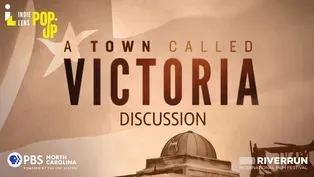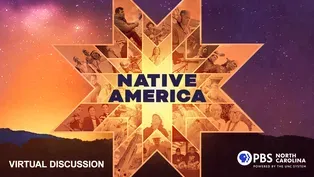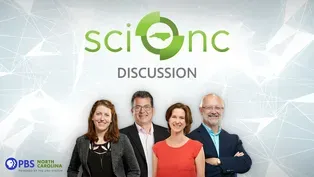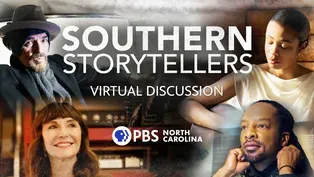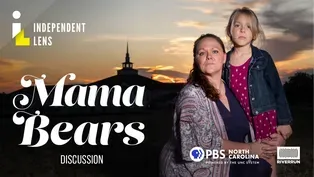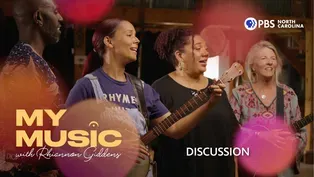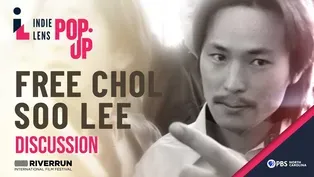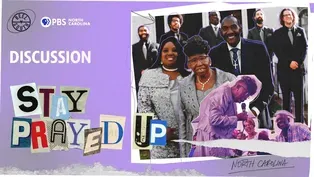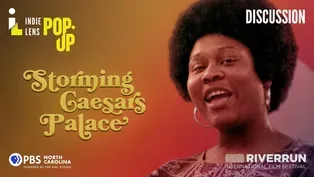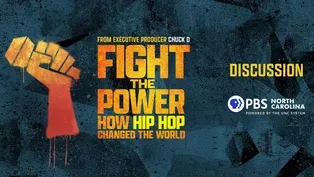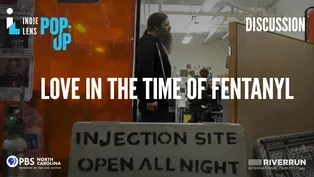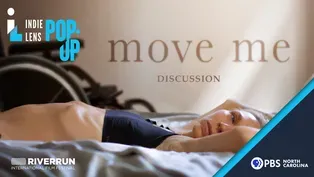PBS North Carolina Specials
Discussion | The Innovators
11/10/2021 | 40mVideo has Closed Captions
Students and professors discuss the innovative programs and initiatives on their campuses.
PBS NC’s Deborah Holt Noel sits downs with Dr. Kimbro and Kenisha Webb who talk about their work in the Julius L. Chambers Biomedical and Biotechnical Research Institute at NCCU. Dr. Bryan Sales discusses innovative agricultural science breakthroughs at UNC Pembroke. NC A&T State doctoral student, Nyteisha Bookert, explains using math and computer science to combat cybercrime.
PBS North Carolina Specials
Discussion | The Innovators
11/10/2021 | 40mVideo has Closed Captions
PBS NC’s Deborah Holt Noel sits downs with Dr. Kimbro and Kenisha Webb who talk about their work in the Julius L. Chambers Biomedical and Biotechnical Research Institute at NCCU. Dr. Bryan Sales discusses innovative agricultural science breakthroughs at UNC Pembroke. NC A&T State doctoral student, Nyteisha Bookert, explains using math and computer science to combat cybercrime.
How to Watch PBS North Carolina Specials
PBS North Carolina Specials is available to stream on pbs.org and the free PBS App, available on iPhone, Apple TV, Android TV, Android smartphones, Amazon Fire TV, Amazon Fire Tablet, Roku, Samsung Smart TV, and Vizio.
Providing Support for PBS.org
Learn Moreabout PBS online sponsorshipMore from This Collection
Discussion - A Town Called Victoria - Independent Lens
Video has Closed Captions
The filmmaker and former Victoria residents share their story. (46m 51s)
Discussion - Native America Season 2
Video has Closed Captions
Panelists discuss preserving the languages of Native American tribes. (39m 1s)
Video has Closed Captions
Sci NC executive producer and host, Frank Graff, chats about upcoming Season 6 of Sci NC. (26m 6s)
Discussion - Southern Storytellers
Video has Closed Captions
Author David Joy and others discuss storytelling and their new PBS series. (42m 13s)
Discussion - Mama Bears | Independent Lens
Video has Closed Captions
Producer and director Daresha Kyi discusses the film and LGBTQIA+ advocacy. (34m 41s)
Discussion - My Music with Rhiannon Giddens
Video has Closed Captions
Discussing the series with producers Will & Deni McIntyre and country artist Rissi Palmer. (39m 56s)
Discussion - Free Chol Soo Lee | Independent Lens
Video has Closed Captions
Local lawyers, professors and nonprofit leaders discuss wrongful convictions and reentry. (40m 44s)
Discussion - Stay Prayed Up, Reel South
Video has Closed Captions
The filmmakers discuss their journey with Mother Perry and The Branchettes. (45m 4s)
Discussion - Storming Caesars Palace | Independent Lens
Video has Closed Captions
Local professors and nonprofit leaders discuss welfare and the social safety net. (33m 2s)
Discussion - Fight the Power: How Hip Hop Changed the World
Video has Closed Captions
Local experts discuss the history of hip hop with PBS North Carolina. (59m 43s)
Discussion - Love in the Time of Fentanyl | Independent Lens
Video has Closed Captions
Local harm reductionists, therapists and others discuss the opioid crisis and more. (55m 44s)
Discussion | Independent Lens: Move Me
Video has Closed Captions
A dancer with blindness and disability advocates discuss adaptable arts programs. (38m 46s)
Providing Support for PBS.org
Learn Moreabout PBS online sponsorship- Welcome everyone and good evening.
My name's Deborah Holt Noel.
I'm the senior producer here at PBS North Carolina for the program Black Issues Forum, and I am so excited that you decided to join us this evening for this special screening, and I am proud to bring you this content.
So welcome once again.
The Innovators film and digital shorts is a production of PBS North Carolina and the University of North Carolina System.
The Innovators project stems from the formation of the Committee on Historically Minority-Serving Institutions created by the UNC Board of Governors in 2018.
The film and the shorts showcase the transformative power of North Carolina's historically black and American-Indian universities.
This project and film were made possible with the guidance and assistance of campus leaders from Elizabeth City State University, from Fayetteville State University, North Carolina A&T State University, North Carolina Central University, the University of North Carolina at Pembroke and Winston-Salem State University.
The film and the series of digital shorts features faculty, students, and alumni from each institution, documenting student aspirations and motivations, introducing the educators, mentoring our next generation and class of trailblazers and showcasing the institution's positive impact on our communities and state that will resonate for generations to come.
I have the privilege of sitting down tonight with some of the best and brightest students and the professors and introducing them to you right now.
So let's meet tonight's special panel of guests.
We have Dr. Sean Kimbro, a professor of biological and biomedical sciences at North Carolina Central University and director of the The Julius L. Chambers Biomedical Biotechnology Research Institute.
He works in the lab at the BBR, and he works alongside our next guest, who is Kenisha Webb, Kenisha is a graduate of the master's program in biological and biomedical sciences at North Carolina Central University.
We also have Dr. Bryan Sales, an assistant professor of biology at UNC Pembroke and also director of the agricultural program and Nytesha Bookert, a PhD student in cyber-crime at North Carolina A&T State University.
So excited, once again, to have all of you here with us along with our audience.
So we are gonna take a few moments now to just share about what you've been experiencing.
I'll kind of wanna open up with you Nytesha.
Nytesha, we saw on the film that you started at North Carolina A&T as a math major, and then you were persuaded to change your major, and now that you are a PhD, what kind of coursework are you focused on now?
- Hi, everyone.
So just a quick correction.
I started my undergraduate career was at South Carolina State University, where I switched my major over, but I did complete my master's degree here at North Carolina A&T, and I am now here as a PhD student, and some of the coursework that I've say I've been able to do was learn programming skills.
I've been able to have the opportunity to learn more about machine learning and cyber-security skills from network security, to things such as web security and internet of things and privacy, and I've also had the opportunity to do some things, such as building different algorithms to complete different tasks, and so my coursework has been a journey, and one of the things I really like at North Carolina A&T is the hands-on part of it.
Most of my assignments include creating something, hacking something or actually solving problems, and it's not just sitting in the classroom being lectured, and that's one of the things I really enjoy about this program and the coursework because I actually get a feel for what I would be doing in the real world and there are so many opportunities to practice and to do some of those real world projects.
- [Deborah] Excellent.
I mean, we definitely need people who kind of can figure their way around hacking.
So we're glad to have you in the industry.
Can you elaborate on some of the research that you're doing and maybe some of the data that you're collecting?
- Yeah, sure.
So right now I'm currently working in cyber-security, the internet of things, and one of the projects I've had the opportunity to work with is the cyber-security forensic hub for women that A&T just built up, and the goal of this is to train students and to provide a service to the community to protect young women against stalkerware and stalkerware is a program that someone may put on someone's phone to monitor all of their activities and see everything that's going on.
It can be very dangerous, especially in situations of domestic abuse, intimate partner violence and things of that nature and so A&T has stood up this center in order to help those victims when they come in, and they can have their phone evaluated and that software can be removed for free of charge, and then the students will go, and they will analyze it, and they take that data, and the researchers then will then go in and look and see, you know, can we detect what are the patterns or the features of this type of activity in order to create these machine learning algorithms to detect that and to help better protect people in the future, especially young women, and the goal is to eventually to expand that, and that's one of the areas I've been able to work on and looking into privacy and just the type of threat models we're looking at because abuser and adversary are two different threat models, and we just want to make sure we're looking into both of those and we're considering all areas of threats because adversaries are not just the only people we don't know.
Some abusers, some threats to some people are those people who may know their passwords, who may have access to their devices, and so it's important that we consider that as well.
- Absolutely.
That is critical, and I'm excited to know that that kind of research is even happening.
I had no idea and just to know that that kind of innovation is happening right around the corner in Durham, North Carolina.
So very best wishes on continuing in that work.
I wanna bring you in, Dr.
Sales.
You're over at UNC Pembroke.
What convinced you or what attracted you to UNC Pembroke?
- Well, what attracted me to UNC Pembroke was the students, the region and the direction that UNCP was going with agriculture.
So there was a lot of work that I was doing to get to the point where I was ready to be a professor, and there was a lot of work that UNCP was doing, some visionary professors who were laying the groundwork, such as Dr. Rieder Hiovich and Dr. Handler, to create my position for me, and the students are exactly who I relate to.
They are a first generation.
They are of modest backgrounds like me.
They are non-traditional students.
They're the type of students that if I needed to place money on, they would succeed and affect positive change in anything that they did, as long as they had the inspiration.
This region has a long agricultural history, but there's so much opportunity for agriculture business and entrepreneurship here, and the university is blessed with this really amazing chancellor, Robin Cummings, who is a huge visionary and advocate for agriculture at UNCP.
So really all of the pieces were there, and we really chose each other, and I'm thrilled to be here.
- And I think a lot of people, probably, would be surprised to learn just how advanced agriculture has come and some of the innovations that are at UNC Pembroke.
- You know, Deborah, when you listen and you watch The Innovators, how many times did people who are not in agriculture reference how their work is applicable in agriculture?
All right?
It permeates our lives.
It's everywhere, and Robeson county is so ripe, and the people who live here deserve this opportunity to be given this agricultural education and become their own entrepreneurs, and really take back this region with agriculture.
There's so many things that we're doing here and from a research perspective, I could tell you that I'm doing amazing water deficit research.
We are improving soil health.
We are increasing soil carbon.
We are finding ways for the local growers to get a jump on the market, off-season production but the real innovation here is that we're offering agriculture at a liberal arts university.
If you want to study agriculture, you're gonna go to a land grant university and agriculture is through the whole state, and there's a lot of people who can't make those choices to go to a land grant, and the fact that we're bringing those opportunities here to Southeastern North Carolina, that in itself is the innovation, and I'm super excited about it.
- Well, I'm sure there are going to be a lot of folks out there that are excited about it as well, and now let me get a question out to you, Kenisha.
Tell us a little bit about your major and some of the research that you're doing in North Carolina Central University.
- Well, I majored in biological and biomedical sciences.
I studied a interleukin.
It's a protein, IL-7, and I studied how its levels are elevated in obese African-Americans.
- [Speaker] Oh my God!
- With type two diabetes from rural North Carolina county, known as Halifax.
- That is so critical too, because, you know, as Dr.
Sales was talking about, that some of the agricultural research and innovations are tied right back to community and so the research that you're doing, I would imagine, also ties back to the community in innovative ways.
- Oh, definitely.
I mean, what's the importance of research if it doesn't impact the people?
So- - Absolutely - The community matters.
[Kenisha laughing] - Community matters, and I just kind of love that when you're focused on community, you're focused on your research.
You actually are in queue to save lives, and that's really what a lot of this is about in many different ways.
Let me get you in here, Dr. Kimbro.
Now, can you explain a little bit.
You know, Kenisha was talking about some of the research that she's doing, but can you kind of elaborate on why that research that she's working on is so important to the broader community but also to minority communities.
- So the idea that a lot deals with the differences and disease occurrence or incidents between different populations, different ethnic groups.
In this case, we use the term racial groups, even though we argue that race is not a biological description of human beings, but that introduction or that inclusion of community in what we do, and out of that averages the kind of the biology of health disparities.
Mixing the two, you're getting more of a complete picture of the value or the impact of some of your research in that population.
So in the case of the work that Miss Webb did and is doing is kind of appreciating the idea that you have a population in a particular region of North Carolina that might be impacted differently by the environment, by the socioeconomic status and we at the lab kind of now introduce the biology into that, whether it be genetics, with the idea that or with the sensitivity of being at HBCU coming to work asking that question.
I think that's what we bring differently than a lot of other schools is that when you're out at HBCU, in this particular case, or a minority-serving institution, you may have a certain expertise that you bring to the table that other universities don't necessarily innately have in their history, and so that's one thing that we do.
So that's the community and the biology intertwined with a student population that is reflective of the people that you are interested in helping and serving.
- And you keyed in on something that I think would be really appealing to anyone who is pursuing biomedical sciences.
There's so many institutions that have a strong reputation for science and for research, but right here at North Carolina Central University, there's something super innovative happening right there, and I would imagine that's got to be very appealing to anyone who wants to study the sciences.
- So yeah.
So I'm the former director of the The Julius L. Chambers Biomedical Biotechnology Research Institute, and that institute was designed on like the premise of studying health disparities as one of its main emphasis.
So here's a commitment made by North Carolina Central University back in 1999 to create a whole theme to embody that theme in the research efforts within the institute, and underneath the name of The Julius L. Chambers is one of our civil rights leaders, and I think when you think about that commitment and that sensitivity, that cultural sensitivity and cultural expertise that a whole institution, such as NCCU, brings to the table is just a unique mix that you just don't get everywhere.
- No, it's very unique and it's very innovative.
So let me bring you in, Nytesha.
I can imagine there's a great need for experts in the field that you work in, cyber-crime.
Can you recommend to students or parents in the audience, what does a student need to major in to go into this field?
Is it math, computer science?
What do they need to kind of be focused on?
- Yeah, sure.
I would definitely like to first start off by saying that it's Computer Science Education Week is coming up.
It's the second week in December, December 6, and so anyone who's interested, they should definitely look that up, but I think as far as computing goes, it's a field that touches on everything, like the hospitals run on it, agriculture is built upon it, transportation, and so cyber-security is so important, and any field you go into is going to touch on it, and so I think majors such as mathematics, computer science, computer engineering, cyber-security, information technology, all of those play a part, and I know I'm pursuing a PhD, but I like to also take the time to emphasize that a college degree is not always necessary.
and that there are a lot of positions that require high school diplomas and just going out and looking into trades and getting certifications and just taking the time to get hands-on experience and just to learn some of it.
In 2020, there were about 300 million records that were exposed in data breaches, and most of those were because of stolen credentials.
So just following basic cyber-security practices could improve a lot of that, and so just, even as individuals, just taking that time to learn some of those things, making sure we don't re-use the same passwords, or just making sure you don't click on any links that you don't know and just learning some of those basics and being hands-on students really give the opportunity to learn some of those things, and there's so much out there that people can use from Hour of Code activities to just going out and learning programming languages, such as Python, to create some of that tools just to see, what can I do?
But I do think you don't have to be in computer science to work with cyber-security.
It touches every field and it's an opportunity for everyone, and I just think actually going out and getting some hands-on experience is the best way to go and just looking up tutorials to maybe learn how to do some encryption.
How do I send out a message where no one else can read?
You know, you could engage in this that way.
Maybe you wanna send a message to your friends that you know.
Maybe you scrambled an alphabet or alone or something like that, just to show them how important it is because encryption is something we hear about every day.
When you shop online, you wanna make sure it's encrypted.
So I would just say to make sure you get your students some hands-on experience, some tutorials and some activities, and that will give them the opportunity to practice it and to see if they like it.
- Wow.
I can tell you are totally into this.
I'm already overwhelmed [Deborah laughing] 'cause I'm like, encryption?
But I think that there's definitely an opportunity there, and at the school, at the university, I would imagine there are the tools and the experts, on the faculty that help make sure that when you get come out, you're gonna be competitive in this industry because the technology changes so rapidly.
- Yes and that is something I think that North Carolina A&T does well as they are involved in research of their own.
They're very involved in the cutting edge technologies and staying up to date.
Like, we're focused on artificial intelligence.
We're working with internet of things, and as 5G comes out.
It's amazing what's out here and the convenience of these technologies.
For example, in the average U.S. household has over 25 connected devices, and just in your home, you are responsible for protecting your home, and so we're just working on educating the public and just making sure we're building those tools, and they work with us.
They give us these projects.
Undergraduates have the opportunity to participate in our research to be exposed to that, to see what's out there for them to work on and my professors, they're all so involved.
They are all so intrigued, and they are so all up to date, on what's going on, that if I come in and I'm like, have you heard about this new attack?
They're like, yeah, I just read a paper about that last week, and I saw it in the news.
They're informed, and they help us, and they're like, you know, maybe you should look at this, and the different perspectives we have is so, and the interdisciplinary teams we have is also very beneficial to myself and my fellow students.
- Very good.
Let me bring you back, Dr.
Sales.
Can you share about some of the career opportunities in the work that you're doing at UNC Pembroke and where some of the additional innovations are?
- Definitely.
I think what's really great about offering agriculture here is when I went to school, I found out about all these incredible job opportunities that I didn't know existed, and unless you went to my school, all these people are left out of these opportunities.
For example, I took off on a Saturday and my students who are so interested in careers, not even in my classes, but across the university, went with me to Charlotte to view Metrolina Greenhouses.
Now they have 200 acres of greenhouse production there, and they start students who have a bachelor's degree with a really nice salary and benefits.
So everything that my students are learning in greenhouse production, we take a tour and we start with the small local greenhouse and nurseries to show them what they can do on their own, and then we take bigger steps and bigger steps and bigger steps, so they learn everything that's applied, but the main thing is how approachable entrepreneurship and business is in this area.
My students grow mums and sell them.
My students are growing poinsettias and we'll be selling them.
We're offering a really beautiful community opportunity for all of Pembroke, and I'm showing students businesses and how to make money on doing some very simple steps, but that is just about getting into the workforce.
Aside from that, we do an incredible job of developing students for graduate school, if they want to.
We're really, really good at that, but what we really want students to do is develop these skills and create jobs and opportunities here so that we can continue to educate students and then employ them here because you can't have one without the other.
So within all of that, it makes for a healthy community, and that's what we're trying to do here at Pembroke, but we're investigating these novel soil amendments that fight climate change.
We learn how to irrigate with less water and how to do it in smart ways.
We learn how to develop crops in protected environments, how to increase yield.
We do so many wonderful things, whether it's a science.
I do a lot of research in the summer with my students.
I think I had five different research projects going on this summer.
I sent our first agriculture student to NC State for our summer long research.
She was gonna be here with us tonight, but she is preventing presenting her findings in Salt Lake City, and our plane got delayed.
There's never a moment when I am not thinking about student development, and I can't separate my career as a professional from student development and the community.
It can keep you very busy, but I don't know how to make that separation because to me, it all goes together.
- Well, I think that's really great that you recognize the cohesiveness of it, and it does kind of, seems to me, create stronger communities.
- Yes - And communities that care about one another and you want folks who are coming to the university to want to stay and give back to the local area.
I mean, North Carolina is a great place to live.
- It is [Deborah laughing] and so many of our students here don't want to leave.
You know, [Deborah laughing] they have strong community ties, and they don't want to leave to go to school somewhere else.
So we're just bringing those opportunities here to them.
- And I wanna encourage our audience.
If you have any questions for anyone on our panel, or you wanna share a comment, please post it in the chat, would love to hear from you, and I wanna hear from you again, Kenisha.
What are your plans after, you know, what are your next steps?
- Well, currently I am working in BBI, the Biomedical Biotechnology Research Institute as a social science research assistant.
So I am like hardcore in the community, working with community engagement.
I'm working on a few projects with helping recruitment.
I'm also being trained by Dr. Kimbro to learn how to manage a lab.
He kind of has a method to his madness with preparing his students for future plans after we leave from with him.
So I'm learning how to, currently, manage a lab and also learn a little bit more about clinical research so that I can conduct my own projects from beginning to end.
So that's kind of what I'm doing now.
I haven't thought about what I'm gonna do after being this research assistant.
- I'll bet you were, I don't know.
Were you at all surprised to see how much is available there for you to experience the technology with and to experiment with so that you can really learn those applicable skills?
- Ah, yes, yes, actually it was.
Coming into the master's program, I was not at all.
I wouldn't say I wasn't prepared, but I was definitely amazed at the amount of resources that were readily available to me to better myself in research, especially the community piece.
I never had the opportunity to be physically in the community, conducting research, well, conducting surveys, and actually meeting people and being able to bring health education to people who are really not aware of their health or what's going on.
So those- - How exciting was that to actually- - That was it.
[Kenisha laughing] - It's almost like.
- That was extremely exciting.
- You keep your own patients.
- Yeah.
It was extremely exciting and I mean, I'm still actively doing it.
So I learned something new every single time I'd go out there.
So I'm only getting better.
I could say that.
[Kenisha laughing] - Aw, I'll bet you are, and it's just awesome when you do get to have an exchange in the field of interest that you have and see the impact that your learning can have on the life of someone else, and that's what's available at these different institutions where all of you are teaching and learning, and, you know, we'd been talking about the innovations that are available at the school, but, Dr. Kimbro, once again, I mean, one of the things that touched me in what you said is that when students come into the school and they look like you, not only do they have a connection to you, but you have a connection to them as well, and you know, that's something really unique at these particular institutions, I would think.
- Yes.
I think one thing I take pride in is the ability to provide a research environment, a laboratory environment that is culturally appropriate and comfortable, and we even have a PhD program at North Carolina Central University, the Integrated Bioscience PhD Program, which is centered in part around health disparities, actually, and so it's one of the few programs in the state that actually has a PhD program where we are actually emphasizing health disparities at the core of the program.
I think one thing that I always enjoy is the idea that you don't only train the bench scientist, the guy that sits at the bench, or the person that sits at the bench, you also help mold the scientists by getting them involved in the community.
So all my students have had opportunities to go out into the community and actually engage the population.
It is really a different thing when you see face to face, the people that you are assisting to solve a problem, but also, you know, now you have this test tube that might have a blood sample in it, and you realize you know or you've seen the people that have contributed to your research.
- Yeah.
- I think Kenisha's had a unique opportunity to see the folks which ultimately led to some novel discoveries of inflammation and are related to diabetes that has not been reported before at any university, and those type of findings are achieved because we actually have that connection.
The students were involved and you have a multidisciplinary approach that is innate to the structure of the NCCU.
- Yeah.
What you're saying is that it matters.
It totally matters and getting ready to do some innovative research and discoveries that are, as you mentioned in the film, gonna have impacts for the community but also for the world at large and we have some questions coming in from people who are watching, and they want to know, is that kind of connection.
This is a question for the students.
Is that connection really there?
It seems like the personal attention that all the students received in the film play a big part in their success.
I'd like for the students on the panel to comment on that.
Let me start off with you Kenisha.
- Yeah, the community is vital.
Like Dr. Kimbro was saying with the sample.
We got a little saying that we say, putting a story through our sample, and it matters, like you say, it matters that we are involved in the community, that we get to know who we're physically helping.
It makes the all the more important.
It makes me more passionate about what I'm doing.
It makes me want to do it more and to get to a point where I can possibly expand who I'm helping 'cause right now we're just in North Carolina, but I mean, we wanna save the world, ultimately.
So, from sickness and disease.
So I think that's the most important part, yeah.
[Kenisha laughing] - Thank you, thank you.
Nytesha, what would you say?
- What I would say it's definitely there.
So, and I would just like to point out that before I came back to get my PhD, I was working for the government, and I came back because of my professors at A&T who thought that I could do research, and they pushed me to that.
It was like, I really think you can do something here.
I really think you can make a difference here, and I was like, hmm, I hear y'all, [group laughing] but it was them coming to me and telling me that truth and feeling comfortable enough to say, hey, you know, I think this is something you can do and so now whenever I'm in a room, I feel comfortable to speak up with my ideas because innovation is important, but it does me no good if I keep it to myself.
So A&T has this culture where I can speak up.
I can challenge because research always has its challenges and limitations.
I can speak up and say, hey, what about this?
And offer my solution.
So it is there in my environment, in my community, and it helps me feel comfortable enough to pass that on to other students that I work with and mentor.
If you speak up, feel free to share with me.
If I'm wrong, I'm wrong, and we can explore that, and think of ways to solve that problem or come up with other solutions but it's definitely there and everything I do, I do it to help that one day it'll help somebody else, even if it's only one person 'cause at the end of the day if you reach one more person, like Kenisha just said, we can change the world.
So I think it's there.
- And I think you are changing the world.
I've heard it right here in this short conversation.
We're about to wrap things up.
Someone's got a question out there for Dr. Kimbro.
Says, are we merging toward programs that offer an introduction to automation and the sciences at the undergraduate and graduate levels?
- So we do have programs that are starting up looking at big data.
We are working towards that.
There are, we are starting to integrate in collaboration with other institutions an idea of big data and health disparities, and so there are some movements in that direction.
It just takes a little time to do this kind of new field as people try to communicate.
I would say overall, we do employ multiple influx of data, whether it be social, behavioral and biological data into analysis of health disparities.
I know we do that in our lab in particular and trying to address some issues.
So I would say that we're moving in that direction.
Programs directly related to that at this time, four more programs I'm not quite aware of at this time at North Carolina Central.
- Well, thank you so much, and, Dr.
Sales, I wanna just bring you in here.
Oh, once again, because toward the beginning of the conversation you shared what drew you UNC Pembroke, and you talked about a connection with students, and we're talking about the connection, that it can help bring about and kind of encourage the success of students at in HBCU, in particular for the black students, but in your case at UNC Pembroke, I know that the school has a very diverse population, but talk a little bit more about your connection, and why you feel that connection with the students at UNC Pembroke.
- I think in general, I'm really, really inspired by the underdog because I have been an underdog, and that's the way I know how to succeed, from that angle.
So that makes me really be able to see our students, and they know I see them.
There's a lot of opportunity here at UNCP, but with that becomes a lot of work.
However, the people who make my job easier are my students, and I have three in particular.
Contina Oxendine, who is the treasurer of the agricultural club, David Hosking, who is the president of the agricultural club and Eric Schwartz, who is a RISE scholar.
These students, like most of my students, know that everything I do, I have their best interest in heart.
So if I ever need anything done, they will do it in the drop of a hat, and I feel this really strong connection with all the students that are in my classes, and I make them point.
If I, even if I've had them once, I stop if I see them in the hall and I say, when do you graduate?
What are you doing after you graduate?
What can I do for you?
Because so much of what I do is developing them, so they can get opportunities that were afforded in me and they haven't been in tune to them yet.
- It's totally- - [Static hissing] Yeah.
- Sounds very much like that kind of servant leader type of role.
- It is, it very much is, and it's very, very moving all of the time here at UNCP, and we have a strong a lot of people who identify as a Lumbee here, and they have persevered for a very long time, and that's how this school was founded.
It was always founded to serve the people who need it the most, and we are still doing that, and that's what makes me thrilled.
You know, we have something here called, we're part of the NC Promise.
So students can come here and get an education for $500 a semester.
I've went to the other schools and I know the burden of student debt.
So the work that I do here with these students, the impact they're gonna have when they leave, it's so much maximized because they are not burdened with what so many other students are burdened with.
- Now that is a word for sure, [Deborah laughing] and we are wrapping up.
I'm gonna get a comment.
You mentioned impact.
Dr. Kimbro, what was the lasting impact that you're hoping to create as you work with the students and push forward the innovations at North Carolina Central?
- I think what the impact I hope to bring or I think we can bring at North Carolina Central University is a complete student, a student that's capable of, not only working and understanding the science, be able to communicate that science, deliver that knowledge to the community, and also that in itself will bring in another round of soldiers to affect and reduce health disparities out there.
So I think that would be the impact that we hope and maybe even provide some possible cures or solutions to the disparities that we see across North Carolina.
- Kenisha, your impact.
- I simply wanna have an impact on the people who my research is conducted for.
I want for people to know, or at least remember like, that girl helped me, or that girl cared, or the people that she worked with cared.
That's the impact I wanna have.
- Significant.
Nytesha, the impact that you wanna have through your research and your work.
- So I would like to help raise awareness to the cyber-security threats and risk that exist for everyone and to protect our most vulnerable and at-risk populations because if they're protected, we're all protected, and just to make sure I'm doing my part to partake at.
It isn't.
- I feel like there's a book coming out from you [Deborah laughing] 'cause that is some needed information.
I just wanna thank each of you.
Dr. Sean Kimbro, Kenisha Webb, Dr. Bryan Sales and Nytesha Bookert.
Thank you so much for your time, and we are out of time.
I just, once again, appreciate each of you for joining us.
This has been a wonderful conversation, and I wanna thank our audience for sticking with us and for your questions and for just being with us for this streaming event.
You can stream The Innovators online at video.pbsnc.org.
They're 10 digital shorts that also can be streamed on our website, and there are new videos that will be released through December 8th.
Please take a moment to fill out the audience survey.
We'd really appreciate that.
The link is in the chat and also be on the lookout for an email early next week, complete with the survey, a link to the recording of this conversation, the list of panelists, links to the six universities that have been featured in The Innovators and additional resources and do not forget to join us online and on TV, PBS NC, for Black Issues Forum every Friday evening at 7:00 p.m. as I talk to the thought leaders who are making decisions and making impact in the black community and talking about the events and issues of the day.
Black Issues Forum airs, once again, on Fridays at 7:00 p.m., and again, on Sundays at four.
You can also join me, and I would love for you to join me on Thursday nights at nine o'clock for North Carolina Weekend, as I explore North Carolina, beautiful state to live and to visit and with that, once again, thank you so much for joining us.
The six public universities featured tonight cannot continue their innovative and life-changing work without your support and so PBS North Carolina so can continue bringing you riveting documentaries, informative how-to programs, fun lifestyle shows, exciting initiatives, a 24-hour kids channel and free information screening events like this one.
I hope that you are inspired to make a tax deductible contribution donation to PBS North Carolina.
You can do that safely and securely, and I'm sure that Nytesha will really appreciate that, [Deborah laughing] on our website, pbsnc.org.
If you're already a member, we greatly appreciate you being a supporter of public television, North Carolina and with that, I wanna wish each of you a safe and happy good night.
- Thank you.
